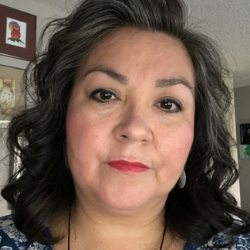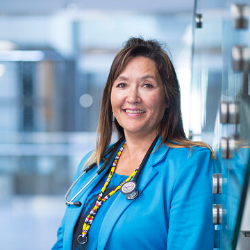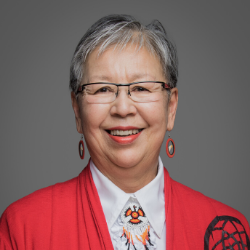2019-2020
March 11, 2020
Health Equity Series: The MMIWG Calls for Justice and their relation to health
Everyone welcome!
Join us for a series of conversations designed to spark conversation about how to collaborate and act to achieve health equity in our communities. Hosted by the Division of Social Accountability.
March 11, 2020
12:30 - 1:30 pm
Room 1130 E-Wing, Health Sciences Building, University of Saskatchewan
Darlene Okemaysim-Sicotte (Iskwewuk E-wichiwitochik Women Walking Together)

Darlene R. Okemaysim-Sicotte, is a Cree from Beardy’s & Okemasis First Nation near the town of Duck Lake, Saskatchewan, and was educated at Rivier Academy in Prince Albert and the University of Saskatchewan. Darlene has been working with the Gordon Tootoosis Nikaniwin Theatre since 2013Darlene’s past experiences in the workplace include Executive Assistant at Saskatchewan Indian Institute of Technologies, Departmental Secretary at U of S Native Studies, and One Earth Farms FN LP. Darlene is also a 15 year member of the Saskatoon concerned citizens group Iskwewuk Ewichiwitochik (Women Walking Together) whose focus is on missing and murdered indigenous women and girls. Darlene received the Queen Elizabeth II Diamond Jubilee Medal in January 2013 for this volunteerism & national finalist and later a juror for Samara.com “Every Day Political Citizen - Project”. Darlene has written published articles and engages in local, provincial, and national interviews media outlets on Missing and Murdered Indigenous Women. Darlene has been the Non-Legal Advocate and co-chair for Iskwewuk E-wichitochik (Women Walking Together) who had Party With Standing status for National Inquiry to MMIWG2S. She currently lives in Saskatoon with her husband Chris Sicotte and mother to Christopher, Cory, Aren, Sunflower, and grandmother to Albert Jr., Dayshawn, and Joseph all of whom enjoy the local, provincial, and national arts scene.
Dr. Veronica McKinney (College of Medicine)

Dr. Veronica McKinney is the Director of Northern Medical Services. Veronica is of Cree/Métis descent and provides leadership in health development in northern Saskatchewan Aboriginal communities promoting the evolution and advancement of healthy communities. She is an Assistant Professor and Chair of the Indigenous Health Committee, College of Medicine, Univ. of Sask, as well as serving on various boards and committees. She practices clinical medicine at the Westside Community Clinic in Saskatoon. She believes strongly in her traditional cultural teachings and applies them to her practice of medicine. She is a strong advocate for Aboriginal people’s health, having witnessed and experienced the inequities firsthand.
Senator Lillian Dyck

She earned her Bachelor of Arts, 1966, Honours, 1968; Master of Science in Biochemistry, 1970, Ph.D. in Biological Psychiatry in 1981, all from the University of Saskatchewan. She was conferred a Doctor of Letters, Honoris Causa by Cape Breton University in 2007.
She has been recognized in a number of ways, such as: A National Aboriginal Achievement Award for Science & Technology in 1999; A YWCA Woman of Distinction Award for Science, Technology & the Environment in 2003 ; two eagle feathers in 2005; an Alumnus of Influence Award, College of Arts & Science, University of Saskatchewan in 2009; an Atlantic Human Rights Center Award in 2019; and most recently the YWCA Saskatoon Women of Distinction Lifetime Achievement Award in 2019.
Senator Dyck was a Full Professor in the Neuropsychiatry Research Unit, Department of Psychiatry and Associate Dean, College of Graduate Studies & Research at the University of Saskatchewan.
In 2005, she was summoned to the senate by the Rt. Hon. Paul Martin. She has been Deputy Chair and Chair of the Standing Senate Committee on Aboriginal Peoples. Her priority area in the last 10 years has been the tragedy of missing and murdered Aboriginal women and girls. Senator Dyck had given over 100 public speeches across Canada on this topic and others. These and her senate speeches are posted on this website.
Senator Dyck amended Bill C-75: An Act to amend the Criminal Code, the Youth Criminal Justice Act and other Acts and to make consequential amendments to other Acts to better protect women - especially Aboriginal women and other vulnerable persons - from abuse, including intimate partner violence.
January 30, 2020: Settler City Limits
Settler City Limits: Indigenous Resurgence and Colonial Violence in the Urban Prairie West on Thursday, January 30th for a public roundtable discussion.
Gordon Oakes Red Bear Student Centre
University of Saskatchewan
10:00 am - 12:00 pm
Thursday, January 30, 2020
2018-2019
Dr. Johnson-Jennings
Wednesday, October 24, 2018
Hollo Micha Oh Chash: Transforming Historical Trauma Narratives to Improve Community Health
Dr. Graham
Wednesday, November 21, 2018
ahkameyimok: Resilience
Dr. TallBear
February 5, 2019
Decolonizing Science & Technology
Dr. Tait
May 8, 2019
Cultural Safety: It's not about culture, it's about racism

